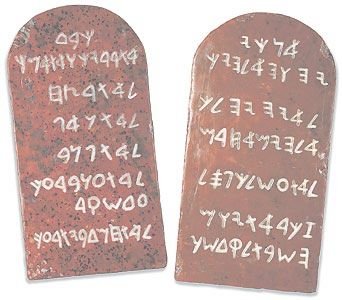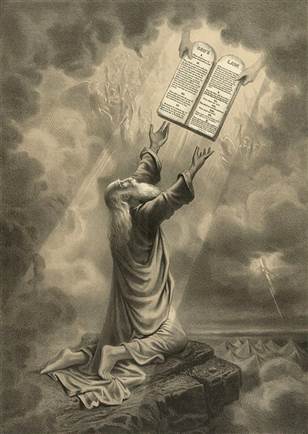YITHRO יִתְר֨וֹ (Jethro) EXODUS 18:1-20:23
PROPHETS: ISAIAH 6:1-7:6, 9:5-6 | GOSPEL: MATTHEW 19:16-26
by Min. Donald H Garrett
TORAH:
In chapter 18, we see Jethro bringing Mosheh’s wife and children to Mosheh. They greet each other and Mosheh shows respect and obeisance to his father-in-law (as instructed in the commandments). Next, they catch up on all that has happened. Jethro comes to the realization that YaHVaH is the one true God and offers sacrifices.
Note who comes out after that, all the elders of Israel and Aaron. They all break 🍞 together. Interesting.

The next morning Jethro sees how Mosheh is being overburdened by judging matters between the people and counsels him to set up minor judges to assist Mosheh. Jethro says to Mosheh, “If you do this thing — and God shall command you — then shall you endure, and this entire people, as well, shall arrive at its destination in peace [Shalom].” Tanach, 18:23. Jethro shows more reverence in saying “and God commands you.” YaHVaH has to be in it. Scripture doesn’t say YaHVaH ever commanded it, it is implied in the statement that Mosheh did everything that Jethro had said. It stands to reason that Mosheh would have asked God and gotten approval before doing it. Either way, the first Hebrew government was formed.
Chapter 19 begins in the 3rd month. This is Sivan on the Biblical calendar. Mosheh goes up on Mount Sinai and receives a Word from YaHVaH that if the nation would hearken and observe YaHVaH’s covenant, then they’d be a beloved treasure. They were to be a kingdom of priests (KJV)/ministers(Tanach) and a holy nation. The Tanach commentary relates that “Although usually translated as priests, the word kohaniym in the context of this verse means that the entire nation is to be dedicated to leading the world toward an understanding and acceptance of God’s mission.” Israel responds “Everything that YaHVaH has spoken we shall do!” They accepted it and Mosheh relates the acceptance to YaHVaH.
The people were then sanctified, told to wash their clothes, and NO sex for 3 days. On the 3rd day, YaHVaH showed his power in thunder, 🌩 lightning, clouds ☁, and the sound of the shofar. The people became afraid and couldn’t ascend the mountain. Only Mosheh and Aaron could ascend after that.
Chapter 20 is traditionally called the Ten Commandments. Yet there are more than 10 mentioned and different religious organizations adopt what they want out of the list. Many begin with verse 2 being the 1st Commandment, yet it isn’t a commandment at all. It is a statement of Who YaHVaH is, then comes the Commandments.
1) You shall not recognize the gods of others,
2) You shall not make a carved image nor any likeness of what is in the heavens, on the earth, or in the sea,
3) You shall not prostrate yourself to them (the images). The Tanach says 1, 2, and 3 are all one Commandment #2 against idolatry. They can all be connected, yet they are all separate commandements: 1=recognizing other gods, 2=making images, and 3=worshipping images as gods when they are not.
4) You shall not take the Name of YaHVaH, your Elohiym, in vain. The Tanach calls this the 3rd Commandment: Prohibition of vain oaths.

5) Remember to sanctify the Sabbath day.
6) You shall work 6 days and accomplish all your work. Yes, YaHVAH commands us to WORK 6 days.
7) The 7th day is Sabbath to YaHVaH, your Elohiym, You shall not do any work — you, your son, your daughter, your slave, your maidservant, your animal, and your convert. The Tanach combines 5, 6, and 7 all as the 4th Commandment: The Sabbath; yet they are 3 separate commandments: 5=rememberance and sanctify, 6=Working 6 days, and 7=No work on the Sabbath. Notice how 6=6 days and 7=Sabbath (7th day). YaHVaH knows how to use symbolism.
8) Honor your father and mother. The Tanach says 5th Commandment.
9) You shall not kill. The Tanach says 6th Commandment: Prohibition against murder.
10) You shall not commit adultery. The Tanach says 7th Commandment.
11) You shall not steal. The Tanach says 8th Commandment: Prohibition against kidnapping. It says that stealing here refers to kidnapping? Really? Why can’t it be ALL stealing?
12) You shall not bear false witness against your fellow/neighbor. The Tanach says 9th Commandment and adds that it also prohibits gossiping and slander.
13) You shall not covet your fellow’s/neighbor’s house 🏠. 14) You shall not covet your fellow’s/neighbor’s wife, his manservant, his maidservant, his 🐂, his donkey, nor anything belonging to your fellow/neighbor. The Tanach combines these and says 10th Commandment: Prohibition against coveting.
See more on the Ten Commandments in my 📖 The Ten Words. 


PROPHETS:
The beginning of this section of the Prophets begins with the cleansing of Isaiah to the point where Isaiah is now willing to go where YaHVaH sends him. Verses 8-13 are where YaHVaH wants a message delivered to the people of how they are sinning and are to be brought low, along with the land becoming desolate. However, He promises the people that if they will repent, the land will be healed. Isaiah asks how long? YaHVaH answers until the cities become desolate, yet YaHVaH goes on to say that it will take the rule of ten kings before it occurs. The guarantee of vitality, being left in the land because of the holy seed, is the last statement.
Chapter 7 is about Ahaz and 3 kings warring against Jerusalem. Yet, they do not win. YaHVaH warns the people further, that evil has been counseled against the city, but evil will not win.
Chapter 9 is the well-known prophecy of the coming Messiah and what He is to be called. This is the announcement for Yeshua, which then leads to it’s fulfillment in the Gospel.
GOSPEL:
This is the place in the Gospels where Yeshua is questioned by a rich man on how he may obtain eternal life in heaven. Yeshua responds for him to obey all the commandments, to which the rich man replies he has done this from his youth. What else is he lacking? Yeshua replies for him to sell ALL his possessions and come follow Him. This response grieves the rich man, who walks away due to his many possessions. Yeshua then councels the disciples on how hard it is for a rich man to enter into Heaven. This make them wonder who then can enter Heaven. Yeshua replies that for man it is impossible, but for God ALL things are possible.
(c) Copyright February 2023, 2024 Min. Donald H. Garrett and Odon Obadyah Ministries, Inc.
Previous: B’SHALACH
Next: MISH’PATIYM







